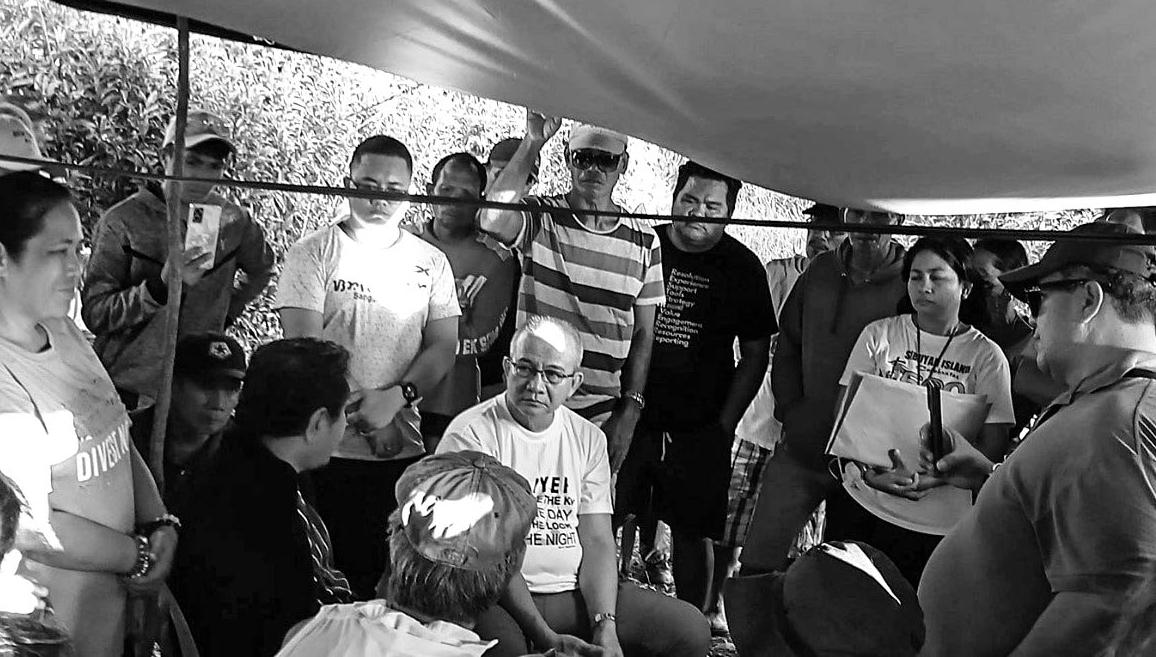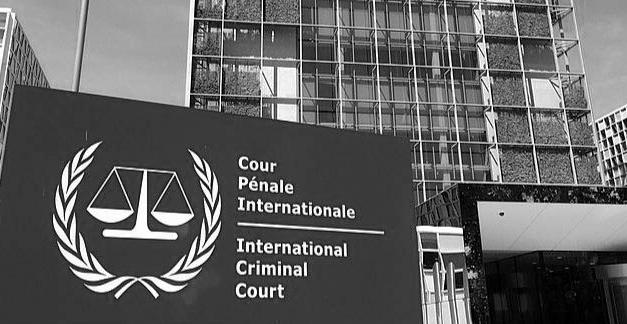
6 minute read
Bishop visits anti-mining barricade in Sibuyan Island
BISHOP Narciso Abellana of Romblon on Wednesday visited Sibuyan Island residents who have been protesting a large-scale mining project, which the local clergy opposes.
Social media photos showed the bishop shedding tears while talking to demonstrators who have been blocking the entry of heaving trucks to the mining site since January 29.
Advertisement
Residents put up a human barricade at Sitio Bato, a village in the island’s town of San Fernando to protest the alleged illegal mining activities of Altai Philippines Mining Company.
Environmental groups claimed the mining firm failed to secure necessary mining permits and documents.
The clergy warned of ‘tragic consequences’ if the nickel mining project pushes through on the island, often referred to as the “Galapagos of Asia” because of its rich biodiversity and pristine remoteness from all the mainlands.
“Unchecked human activity will have its tragic consequences, running the risk of destroying nature, thus running the risk of destroying humanity,” the clergy
Caritas Philippines, the social action and advocacy arm of the Catholic Bishops’ Conference of the Philippines (CBCP) welcomes the resumption of the International Criminal Court’s investigation of the bloody drug war and extrajudicial killings that took place during the Duterte administration.
“The resumption of the probe will allow due process to run its course and ensure justice and truth will prevail,” said Caritas Philippines executive director Fr. Antonio Labiao, Jr. “This is a step in the right direction to promote transparency, fairness, and trust in public institutions.”
On January 26, the ICC Pre-Trial Chamber (PTC) said it had approved ICC Prosecutor Karim Khan's request to continue its probe into "the Situation of the Republic of the Philippines".

"Following a careful analysis of the materials provided by the Philippines, the Chamber is not satisfied that the said in a statement.
“Land is life. Water is life. We only have one world to live in. Let us protect the environment! Let us protect nature! No to mining!” they said.
The Romblon Diocesan Council of the Laity also issued a statement on Sunday deploring the continuous attempts of the mining company to mine the island.
The lay organization also criticized the government for “turning a deaf ear and permitted the corporation to reach our soil” despite strong public opposition.
“Together with all the people of good will in the Diocese who cry out against mining, we cry with one voice, stop mining in Sibuyan,” they said.
“As an expression of solidarity, we appeal to all the faithful to storm the heavens with our prayers, and provide every possible support to the people of Sibuyan who struggle for justice,” they added. CBCP News
Caritas Philippines welcomes resumption of ICC probe
Philippines is undertaking relevant investigations that would warrant a deferral of the Court’s investigations on the basis of the complementarity principle," the international court said.
Fr. Labiao added, “the Senate and the House of Representatives should exert pressure and issue a resolution addressed to President Marcos allowing the ICC to resume its investigation. If the government has nothing to hide then it has nothing to fear.”
A Technical Working Group on Human Rights is being spearheaded by the CBCP, Caritas Philippines, and the Conference of Major Superiors in the Philippines (CMSP), with the Swiss Catholic Lenten Fund, Bicol Consortium for Development Initiatives (BCDI) Inc., and Task Force Detainees of the Philippines also part of the initiative. The group is working on a human rights campaign and is looking to the UN Joint Programme on Human
Salt and light make a difference. Salt adds flavor to food. We who experience darkness whenever there are brownouts know how a little light makes a difference. For these reasons Jesus chose the similes of salt and light in this Sunday’s gospel, “You are the salt of the earth…you are the light of the world.” This is a clear challenge of discipleship. One who chooses to follow the way of Jesus has to make a positive difference in the surroundings where she moves, either by way of salt or by way of light.
Rights for support on its work on education/capacity building, documentation of cases, resource mapping, and assistance to victims of human rights violations.
“We urge President Marcos to allow the ICC to conduct its investigation freely and show that the government is sincere in its vow to promote accountability and protect human rights,” said BCDI president Fr. Jovic Lobrigo. CMSP co-executive secretary Fr. Christian “Toots” Buenafe meanwhile said there is a need “to humanize the discussions on human rights in the Philippines which is currently focused on redtagging, militarization, and culture of impunity/ violence. There should be meaningful discourse and engagement instead of vilifying perceived critics.
“We are calling on all sectors, especially the academic and business sectors, to join the campaign and advocate for a culture of respect for human dignity and protection of human rights for everyone, regardless of their circumstances,” he added. Caritas Philippines
Reflections
order to proclaim the message of the kingdom. They are seen in pulpits, in media, and they become public figures, even celebrities. One such shining light was St. Pope John Paul II. He was an international leader. He travelled, preached, taught, and became involved in world events, even in the political scene.
Salt is important and has influenced the growth of civilizations. Salt is manufactured, traded, and even took the place of money. Roman soldiers were paid in salt, hence the word salary. Salt is used for seasoning, for food preservation, and for cleaning. Today, in our country due to a weak salt industry, there is a shortage of salt, going the way of sugar and onions. In that famous movie “Gandhi”, the British rulers outlawed the locals from making salt. Gandhi led the famous salt march to the sea where he made salt from the seawater, in defiance of British law. Jesus therefore chose a very simple object in everyday life to show the disciples that they are as important as salt. When salt is used as seasoning, it may not be seen but there is a difference in terms of flavor. Some disciples proclaim the kingdom in silent ways, especially by their witnessing.
Light on the other hand is more noticeable during darkness. Light cannot be hidden. Just a little bit of light is visible. And so it is that sentries or guards are not supposed to smoke when they are on duty at night so as not to be easily seen by the enemy. Like a shining light, some disciples may have to keep a high profile in
There are therefore two ways of making a difference as a disciple of Christ. It really depends on one’s talents, personality, and gifts. There is the way of the salt, simple, lowly, and unseen but they make a difference. There is the way of the light, publicly noticeable, and recognizable. The important thing, is that the messenger knows that he is not the center. The center is Jesus and His message about the Kingdom.
All of us, at some point in our life have been influenced by some person for the better. It could be our parents, our teachers, our bosses, and anyone who took the time to teach and mentor us. Many times, in retirement ceremonies, I have listened to former students giving accolade to their teacher in the elementary grades. I remember particularly one teacher in religion who corrected my answer in her class. I was in first year high school and I answered her question about confession. I said, “We are not sure if we are forgiven.” She told me, “Remain after class” and taught me the value of confession. She was one of the sign posts in my vocation to the priesthood. She took the time to explain the sacrament of confession to me. After ordination, forty-seven years ago, I took the effort to track her down in Luzon to tell her I have become a priest. She died as a nun in her eighties knowing she made a difference in my life. Did you make a difference in someone’s life? Who made a difference in your own life?
Readings: no. 329, p. 161 or no. 528, p. 639
1st Reading: Genesis 1.1-19
Gospel: Mark 6.53-56
Readings: no. 330, p. 164
1st Reading: Genesis 1.20 – 2.4a
Gospel: Mark 7.1-13
Readings: no. 331, p. 167
1st Reading: Genesis 2.4b-9, 15-17
Gospel: Mark 7.14-23
Readings: no. 332, p. 169
1st Reading: Genesis 2.18-25
Gospel: Mark 7.24-30
Readings: no. 333, p. 171 or no. 530, p. 639
1st Reading: Genesis 3.1-8
Gospel: Mark 7.31-37
Readings: no. 334, p. 173
1st Reading: Genesis 3.9-24
Gospel: Mark 8.1-10






